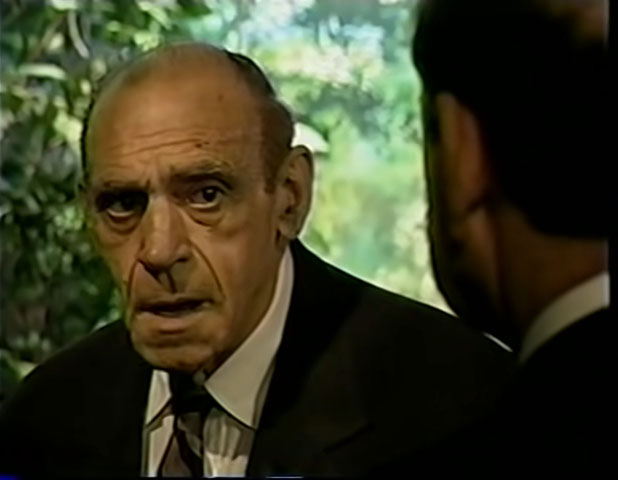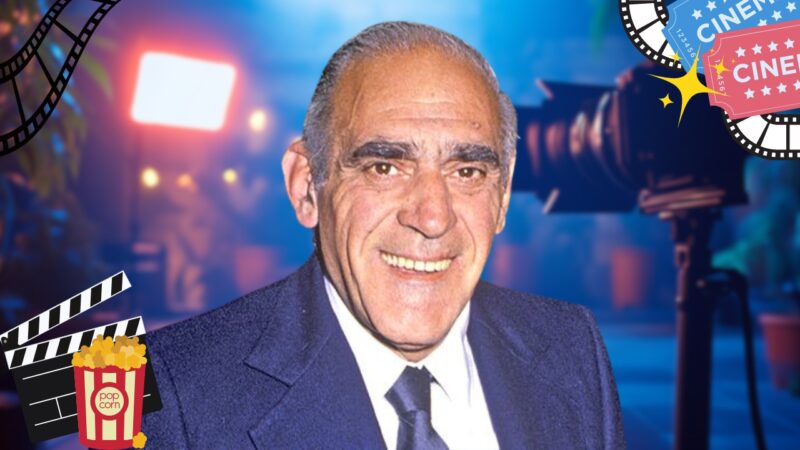Abe Vigoda was a well-known American character actor who achieved widespread recognition for his roles in film, television, and theater.
He is most famously remembered for playing Salvatore Tessio in The Godfather and Phil Fish in Barney Miller.
Vigoda’s career spanned several decades, where he effortlessly transitioned between dramatic and comedic roles.
His presence became iconic, not only for his performances but also for his unique appearance and dedication to the craft of acting.
Early Life and Background (1921-1947)
Abraham Charles Vigoda, better known as Abe Vigoda, was born on February 24, 1921, in Brooklyn, New York, to Jewish parents who had immigrated from Russia.
His father worked as a tailor, a profession that emphasized the importance of hard work and dedication, values that would follow Vigoda throughout his life.
- One of his brothers, Bill Vigoda, achieved success as a comic book artist, highlighting the creative potential within the family.
Abe took on various jobs early in life to support himself, including working as a printer before the outbreak of World War II. His sense of duty and patriotism led him to enlist in the U.S. Army during World War II in 1943.
Following the war, Vigoda decided to follow his true passion, acting. Utilizing the GI Bill, he enrolled at the American Theatre Wing, a prestigious institution known for producing some of the finest actors of the time.
- Studied acting on the GI Bill at the American Theatre Wing.
With a formal education in acting and an undeniable love for the stage, Vigoda began to make a name for himself in the entertainment world, laying the foundation for what would become a long and varied career.
Stage Beginnings and Early Acting Career (1947-1960s)
Vigoda officially became a professional actor in 1947, marking the beginning of a long career that would see him grace stages across New York and beyond. He quickly gravitated toward theater, honing his skills in front of live audiences.
One of his earliest notable achievements was his work on Broadway, where he appeared in productions like Marat/Sade (1967) and The Man in the Glass Booth (1968).
These performances cemented his reputation as a serious stage actor capable of tackling complex roles.
Vigoda made a name for himself through live drama series such as Studio One. This platform gave him opportunities to showcase his versatility, engaging with a wide range of characters and stories.
The stage and television work during these early years were crucial in establishing his credibility and giving him the momentum needed to transition into film, which would come to define the next phase of his career.
Breakthrough in Film: The Godfather (1972)
Abe Vigoda’s breakthrough role came in 1972 when he was cast as Salvatore Tessio in The Godfather, a role that would forever be associated with his name. His journey to this iconic part began with an open casting call, where he impressed director Francis Ford Coppola enough to secure the role.
As Tessio, Vigoda portrayed a cold and calculating caporegime who was loyal to the Corleone family until his betrayal toward the end. His performance earned him critical acclaim and made him a standout among the ensemble cast.
Although his role in The Godfather was relatively small compared to others, Vigoda’s portrayal left a lasting impression. His character’s betrayal became one of the most memorable scenes in the film.
He returned briefly for The Godfather Part II in 1974, solidifying his place within one of the most legendary film franchises in cinema history.
Television Success: Barney Miller and Fish (1975-1978)
After his success in film, Vigoda found further fame on television, particularly with his role as Phil Fish in the hit sitcom Barney Miller (1975-1977). As the world-weary detective, Vigoda embodied the persona of a grumpy but endearing officer with a unique sense of humor.
His portrayal resonated with audiences, and he quickly became one of the most beloved characters on the show. His gruff exterior, paired with subtle comedic timing, made Phil Fish a standout role in Vigoda’s career.
Due to the popularity of his character, a spin-off show titled Fish was created in 1977, centered around the detective’s personal life and his time caring for a group of foster children.
Though the series had a short run, ending in 1978, it showcased Vigoda’s versatility as he brought depth and warmth to a character who could easily have been one-dimensional. His time on television cemented his status as a beloved figure in American households.
Later Career (1980s-2000s)
As Abe Vigoda entered the 1980s, his career showed no signs of slowing down. He continued to take on numerous roles across film and television, proving his adaptability and enduring appeal.
Notably, he appeared in Cannonball Run II (1984) and Look Who’s Talking (1989), displaying his willingness to take on lighter, more comedic projects.
His talents even extended to voice acting, where he provided the voice of a mobster in Batman: Mask of the Phantasm (1993), further diversifying his already extensive portfolio.
In addition to his film and TV roles, Vigoda became a recurring figure in pop culture.
His appearances on shows like Saturday Night Live and Law & Order kept him in the public eye, but it was the mistaken reports of his death that added a unique layer to his fame.
Despite his actual longevity, running jokes about whether Vigoda was alive or not became a quirky part of his legacy. This playful reputation showed that, beyond his serious roles, Vigoda had a sense of humor about his career and public perception.
Personal Life
His personal life was, in many ways, a contrast to the often intense and gruff characters he portrayed. He married twice, first to Sonja Gohlke, with whom he had one daughter, and later to Beatrice Schy, to whom he was married until she died in 1992.
Family was important to Vigoda, and he remained close to his daughter throughout his life, spending his final years in her care.
Outside of his work, Vigoda had a passion for sports, particularly handball, a game he claimed to have nearly mastered in his younger years.
Despite his fame, Vigoda lived a relatively private life, preferring to focus on his craft and enjoy simple pleasures. His interests outside of acting, such as handball, showcased a well-rounded individual with a love for physical activity and competition.
He maintained a humble approach to life, even as his career elevated him to iconic status in Hollywood and on television.
Legacy and Death (2016)

Abe Vigoda passed away on January 26, 2016, at the age of 94, while staying at his daughter’s home in New Jersey. His death marked the end of an era for a generation of film and television fans who had grown up watching his performances.
The announcement of his passing sparked a wave of tributes, particularly for his roles in The Godfather and Barney Miller. Vigoda’s longevity, both in life and in his career, made him a beloved figure whose work left an indelible mark on the entertainment industry.
Though his passing was mourned, there was also a sense of celebration for a life and career well-lived. However, a minor controversy arose when Vigoda was excluded from the 2017 Academy Awards memorial reel, leading to public outcry over the omission.
Despite this, his legacy as an unforgettable character actor remains intact, with his roles continuing to be revered by fans and critics alike.
Summary
Abe Vigoda had a career that was marked by his ability to seamlessly transition between dramatic and comedic roles. His performances, particularly as Salvatore Tessio and Phil Fish, left a lasting impression on both Hollywood and television audiences.
Vigoda’s presence and dedication to his craft ensured his place as one of the most beloved character actors in entertainment history.

